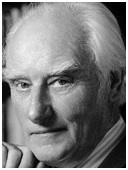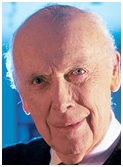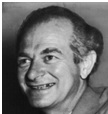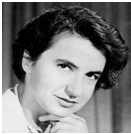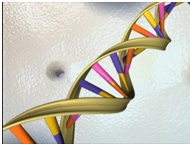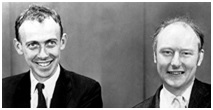|
 |
|
 |
Francis Crick and James Watson - Creativity and Science
Francis Crick (1916-2004) and James Watson (1928- )
English (Crick, pictured right above) and American (Watson, pictured right below) scientists Discovered the molecular structure of DNA in 1953 with its double helix shape. This led to:
Why were they so creative?
1. Teamwork and talent They worked together brilliantly because of their:
a) complementary skills. Crick was a physicist and biologist and Watson, a zoologist with a PhD in the bacterial viruses.
b) creative tension They openly and honestly shared their ideas and challenged each other to justify them. This led to a tension between them that created many good ideas.
2. Competition They were spurred on by the race to find the DNA structure first. Key competitors were:
Wilkins (but unfairly not Franklin) jointly won the Nobel prize for medicine in 1962 with Crick and Watson.
3. Learning from the failure They learned from their many mistakes and unsuccessful experiments. Watson believes that progress in science involves taking backward as well as forward steps.
4. Purpose with relaxation and freedom They were completely focused on finding the DNA structure. In their 18 months together before their discovery, they only spent about three months exclusively working on it. But they were still thinking about it when working on something else or relaxing (particularly walking or chatting over coffee). If they were stuck, they thought about something else, and then went back to it. Watson once said that scientific breakthroughs require giving a dynamic group of researchers “virtual seclusion” and great freedom, whilst “fostering competitiveness”. 5. Learning from others They continually analysed the work of other scientists, particularly Rosalind Franklin, pictured right, (at King's College, London). Without her consent, they examined her research data, including an X-ray photograph of the DNA. This was vital to their discovery of the DNA structure a month later. She didn’t get the recognition she deserved, and tragically died of cancer in 1958 at the age of 37.
6. Intuition This helped their success, but Rosalind Franklin didn’t have it. This is probably the main reason why she lost the race to find the DNA double helix structure, pictured right (see point 5).
7. Revolutionary thinking They were rebels who loved challenging and disproving existing knowledge. “We were not consensus thinkers”, Watson says. They are pictured right at the time of the DNA discovery.
8. Excitement and curiosity They were passionate and excited about DNA or any other new discovery. “I just like to know why things happen”, Watson says.
9. Luck They came from relatively rich, middle class families and went to good schools. They were also lucky to work together at the Cavendish Laboratory in Cambridge, England, then the best place to study DNA in the world. Crick went there in 1949, and Watson joined him two years later.
Key quote on creativity (Crick) Chance is the only source of true novelty.
Key quotes on creativity and innovation (Watson) It’s necessary to be slightly underemployed, if you are to do something significant. Continually exposing your ideas to informed criticism is very important. Never do anything that bores you. Innovation so often comes from something not part of a big organization, where by being small, and just being separate from the ordinary wisdom, you get something done. I think people are born curious and they have it pounded out of them.
|
|
|
||
|
|
|
||
|
||
| Copyright © wisdomtowin.com All Rights Reserved | ||
|

